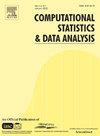Heterogeneity-aware transfer learning for high-dimensional linear regression models
IF 1.6
3区 数学
Q3 COMPUTER SCIENCE, INTERDISCIPLINARY APPLICATIONS
引用次数: 0
Abstract
Transfer learning can refine the performance of a target model through utilizing beneficial information from relevant source datasets. In practice, however, auxiliary samples may be collected from different sub-populations with non-negligible heterogeneity. In this paper we assume that each dataset involves a common parameter vector and dataset-specific nuisance parameters and extend the transfer learning framework to account for heterogeneous models. Specifically, we adapt the decorrelated score technique to deal with the dataset-specific nuisance parameters and develop a strategy to leverage possible shared information from relevant source datasets. To avoid negative transfer, a completely data-driven algorithm is provided to determine the transferable sources. The convergence rate of the proposed estimator is investigated and the source detection consistency is also verified. Extensive numerical experiments are conducted to evaluate the proposed transfer learning algorithms, and an application to the Genotype-Tissue Expression dataset is exhibited.
高维线性回归模型的异构感知迁移学习
迁移学习可以通过利用来自相关源数据集的有益信息来改进目标模型的性能。然而,实际上,辅助样本可以从具有不可忽略的异质性的不同亚种群中收集。在本文中,我们假设每个数据集都包含一个共同的参数向量和数据集特定的干扰参数,并扩展迁移学习框架以考虑异构模型。具体来说,我们采用去相关评分技术来处理数据集特定的干扰参数,并制定了一种策略来利用来自相关源数据集的可能共享信息。为了避免负迁移,提出了一种完全由数据驱动的算法来确定可迁移源。研究了该估计器的收敛速度,并验证了源检测的一致性。广泛的数值实验进行了评估所提出的迁移学习算法,并展示了基因型-组织表达数据集的应用。
本文章由计算机程序翻译,如有差异,请以英文原文为准。
求助全文
约1分钟内获得全文
求助全文
来源期刊

Computational Statistics & Data Analysis
数学-计算机:跨学科应用
CiteScore
3.70
自引率
5.60%
发文量
167
审稿时长
60 days
期刊介绍:
Computational Statistics and Data Analysis (CSDA), an Official Publication of the network Computational and Methodological Statistics (CMStatistics) and of the International Association for Statistical Computing (IASC), is an international journal dedicated to the dissemination of methodological research and applications in the areas of computational statistics and data analysis. The journal consists of four refereed sections which are divided into the following subject areas:
I) Computational Statistics - Manuscripts dealing with: 1) the explicit impact of computers on statistical methodology (e.g., Bayesian computing, bioinformatics,computer graphics, computer intensive inferential methods, data exploration, data mining, expert systems, heuristics, knowledge based systems, machine learning, neural networks, numerical and optimization methods, parallel computing, statistical databases, statistical systems), and 2) the development, evaluation and validation of statistical software and algorithms. Software and algorithms can be submitted with manuscripts and will be stored together with the online article.
II) Statistical Methodology for Data Analysis - Manuscripts dealing with novel and original data analytical strategies and methodologies applied in biostatistics (design and analytic methods for clinical trials, epidemiological studies, statistical genetics, or genetic/environmental interactions), chemometrics, classification, data exploration, density estimation, design of experiments, environmetrics, education, image analysis, marketing, model free data exploration, pattern recognition, psychometrics, statistical physics, image processing, robust procedures.
[...]
III) Special Applications - [...]
IV) Annals of Statistical Data Science [...]
 求助内容:
求助内容: 应助结果提醒方式:
应助结果提醒方式:


